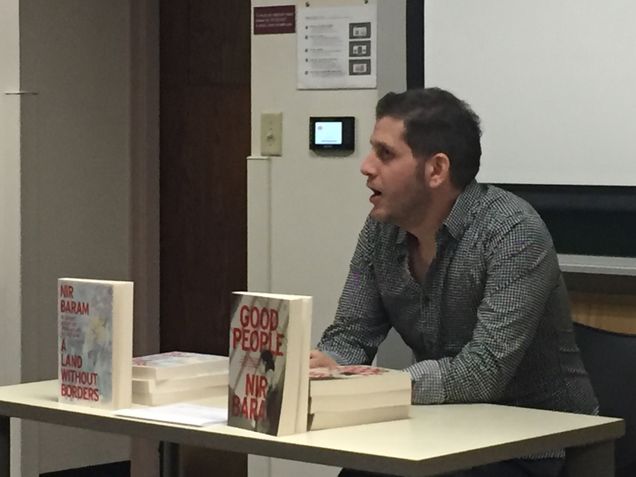“The Land Beyond the Mountains” Film Screening with Nir Baram
The Elie Wiesel Center screened journalist Nir Baram’s documentary The Land Beyond the Mountains, based on his book A Land Without Borders, to a packed audience of students and faculty in CAS 226 on Monday, October 30. 
The film follows Baram as he travels throughout the West Bank, meeting people with a variety of opinions about how to resolve the Israeli-Palestinian conflict. He interviews a member of Hamas, Israeli homeowners, Israeli and Palestinian political activists, and even Baram’s own father, a left wing politician. Through these conversations, Baram attempts to get to the truth of what life is like in this contentious stretch of land, which encompasses both beautiful neighborhoods and slum-like housing conditions that coexist along the border wall. While at the beginning of the film Baram seemed to believe in the possibility of a peaceful two-state solution, by the end of the film he questioned whether the conflict could be really be resolved by these means. The Palestinians he spoke with want to draw attention to their displacement in 1948, while Israelis on the whole want to negotiate around the borders designated in 1963. Baram argues that this difference in conversation, and miscommunications between the Palestinian activists and the Israeli government, makes the conflict more difficult to solve. He ends the film highlighting the grassroots work of groups like Two States One Homeland; it is the people of the West Bank organizing and speaking together that will, in his opinion, bring the conflict to an end.
Baram answered audience questions following the screening, discussing how he adapted his written work into the medium of film and how his viewpoint altered over the course of making the film. He also talked about a few of his subjects, including the Hamas member with whom he keeps in touch, and of his optimism that the conversation can be shifted in a way that promotes justice.

Baram answering audience questions following the screening.

The audience at the screening, which included Hebrew Program faculty Mira Angrist, Professor Abigail Gillman of Religion and Professor Michael Zank.